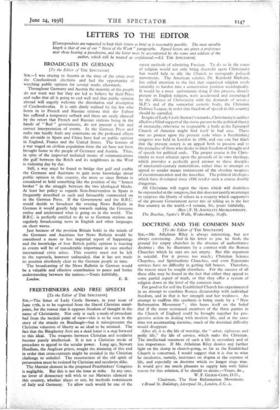FREETHINKERS AND FREE SPEECH
[To the Editor of THE SPECTATOR] SIR,—The letter of Lady Castle Stewart, in your issue of June 17th, is to be regretted from the liberal Christian stand- point, for the reason that it opposes freedom of thought in the name of Christianity. Not only is such a mode of procedure bad from the tactical point of view—this is to be seen in the story of the attacks on Bradlaugh—but it misrepresents the Christian valuation of liberty as an ideal to be attained. The fact that the Blasphemy Acts are a dead letter is a step forward to this ideal. The weapons between Christian and secularist become purely intellectual. It is not a Christian mode of procedure to appeal to the secular power. Long ago, Stewart Headlam, the Anglican priest, sought the attaining of this end in order that cross-currents might be avoided in the Christian challenge to unbelief. The resurrection of the old spirit of persecution must be resisted by Christian and secularist alike.
The Marxist element in the proposed Freethinkers' Congress is negligible. But this is not the issue at stake. In any case, no lover of democracy will wish to see Marxists silenced in this country, whether aliens or not, by methods reminiscent of Italy and Germany. To allow such would be one of the surest methods of admitting Fascism. To do so in the name of religion would not only bring discredit upon Christianity but would help to ally the Church to retrograde political movements. The American scholar, Dr. Reinhold Niebuhr, has called attention to the fact that organised religion tends naturally to harden into a conservative position sociologically. It would be a most unfortunate thing if this process, already present in English religion, were accelerated and encouraged by the alliance of Christianity with the demands of seventy M.P.'s and of the somewhat esoteric body, the Christian Defence League, in order that freedom of speech in this country should be curtailed.
In spite of Lady Castle Stewart's remarks, Christianity is neither allied to a blind support of the status quo nor to the political theory of monarchy, otherwise so respectable a body as the Episcopal Church of America might find itself in bad case. There was no protest upon the present scale when a freethinking congress was held in London in 1886, and one can but think that the present outcry is an appeal both to passion and to the prejudice of those who desire to limit freedom of thought and of speech for political ends. The proper course is for Chris- tianity to meet atheism upon the grounds of its own theology, which provides a perfectly good answer to these disciples of nineteenth-century materialism, rather than to attempt an appeal to secular means reminiscent of the obsolete weapons of excommunication and the interdict. The political ideologies which have developed since 1886 render such a course doubly dangerous.
All Christians will regret the views which will doubtless be expounded at the congress, but this does not justify an attempt to suppress the liberty of others in a country which supporters of the present Government never tire of telling us is the last free country in the world.—I remain, Sir, yours faithfully,
(Rev.) F. H. AMPHLETT MICKLEWRIGHT.
The Beeches, Squire's Walk, Wednesbury, Staffs.














































 Previous page
Previous page